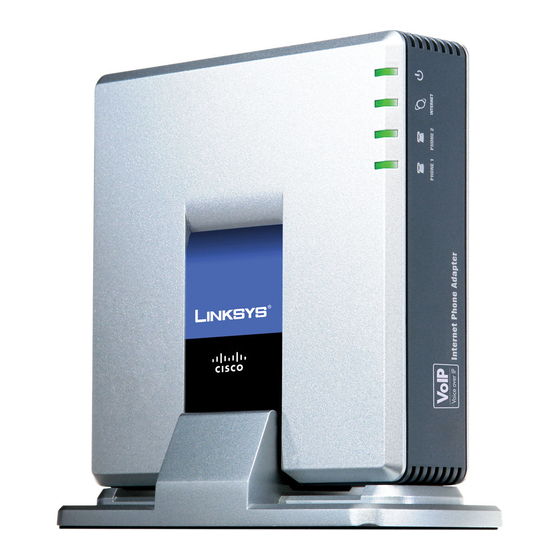Cisco Linksys PAP2 Installation And Troubleshooting Manual - Page 22
Browse online or download pdf Installation And Troubleshooting Manual for IP Phone Cisco Linksys PAP2. Cisco Linksys PAP2 46 pages. Cisco ip phone adapter with 2 ports for voice-over-ip installation and troubleshooting guide

Phone Adapter with 2 Ports for Voice-over-IP
7. Reboot one of your networked computers, and check to see if you have an active Internet
connection.
8. Pick up the telephone. You should now have a dial tone.
•
Set up port forwarding on your router. You must specify that four port ranges be forwarded to the IP
address of the Phone Adapter. These four port ranges are as follows: 5060-5061 (UDP), 53-53 (UDP),
69-69 (UDP), and 10000-20000 (UDP).
Before you set up port forwarding on your router, change two of the Phone Adapter's settings using its
Interactive Voice Response Menu. First, disable its DHCP feature, and then assign a static IP address to
the Phone Adapter. Refer to "Chapter 4: Using the Phone Adapter's Interactive Voice Response Menu" for
instructions.
If you have a non-Linksys router, refer to its documentation for instructions.
If you have a Linksys router, then follow these instructions:
1. On one of your networked computers, open your web browser.
2. Access the Router's Web-based Utility by going to http://192.168.1.1 or the IP address of the
Router.
3. A login screen will appear. Leave the User Name field blank. Enter the Router's password (the
default is admin) in the Password field. Then click the OK button.
4. Click the Applications & Gaming tab, and then click the Port Range Forwarding tab.
5. For each port range you must specify, enter a different name in the Application field. Then enter the
number or range of external port(s) used by the Phone Adapter.
6. Select the protocol you will be using, UDP.
7. Enter the IP address of the Phone Adapter. For example, if the Phone Adapter's IP address is
192.168.1.100, you would enter 100 in the field provided.
16
Appendix A: Troubleshooting
Common Problems and Solutions
